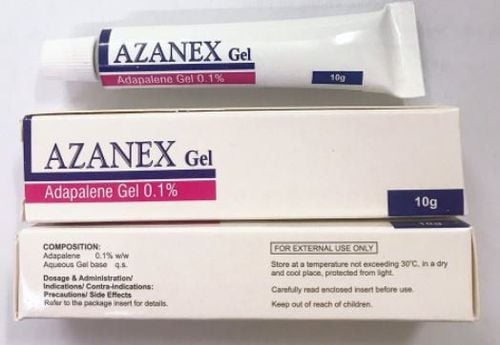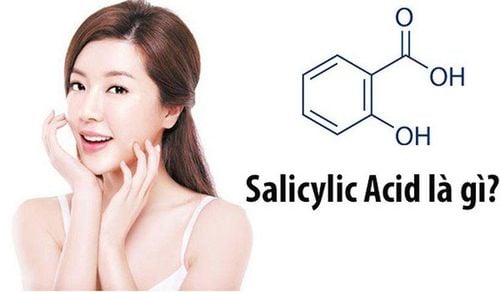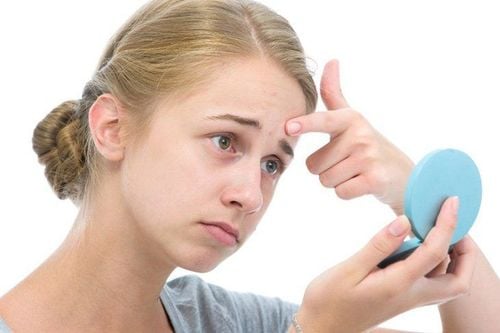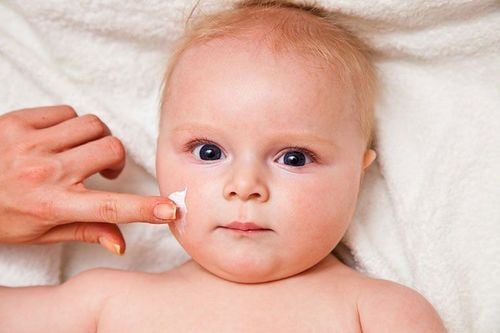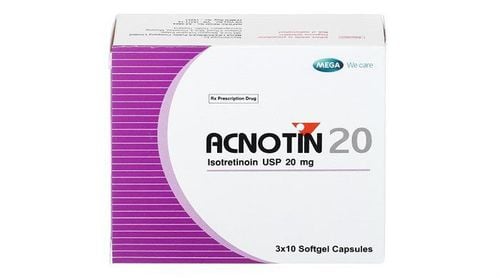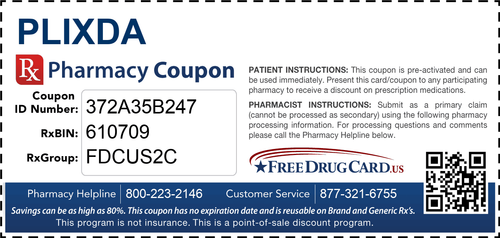This is an automatically translated article.
Acne is a fear of most women, making many people feel insecure about their appearance when communicating. Together we will learn about effective acne treatments through the article below.1. Signs of acne
Signs and symptoms of acne vary depending on the severity of the condition, including:
Whiteheads (closed pores) Blackheads (open pores) Small bumps , red Pimples (pustules), which are papules with pus at the top Appears as large, hard, painful papules under the surface of the skin. Pustules appear below the surface of the skin (cystic lesions)
Trắc nghiệm: Bận rộn có ảnh hưởng đến sức khỏe của bạn không?
Cuộc sống hiện đại khiến chúng ta vì quá bận rộn mà quên chăm sóc sức khỏe cho chính mình. Ai cũng biết rằng lịch trình làm việc cả ngày có thể khiến bạn kiệt sức, nhưng cụ thể bận rộn ảnh hưởng thế nào tới sức khỏe? Hãy cùng làm thử bài trắc nghiệm dưới đây.
2. What causes acne?
Four main factors cause acne, including:
Too much oil skin Obstruction of pores Bacteria Overactive hormones (androgen) Acne usually appears on the face, forehead, chest, upper back and shoulders because of these areas This skin has the most oil (sebaceous) glands. The pores are connected to the sebaceous glands.
Blackheads are clogged hair follicles due to dead cells, bacteria and oil that when exposed to air will oxidize and turn black. Whiteheads are different from blackheads, this is also a type of acne caused by clogged pores, but this type is not exposed to the outside air, so it is white.
Pimples are raised red spots, usually white when blocked hair follicles become inflamed or infected with bacteria. Congestion and inflammation deep within the hair follicles create cystic masses under the surface of your skin. Other pores in your skin, like sweat glands, are not usually associated with acne.
A number of factors can make acne worse, such as:
Hormones: Androgens hormone increases in boys and girls during puberty, causing the sebaceous glands to enlarge and produce more sebum. Hormonal changes related to pregnancy and oral contraceptive use can also affect sebum production. Low androgen levels in women can make acne worse. Certain drugs. Examples include drugs containing corticosteroids, testosterone, or lithium. Diet. Studies indicate that certain dietary factors, including skim milk and high-carbohydrate foods — like bread, bagels, and chips — can worsen acne. Stress: Stress can make acne worse.
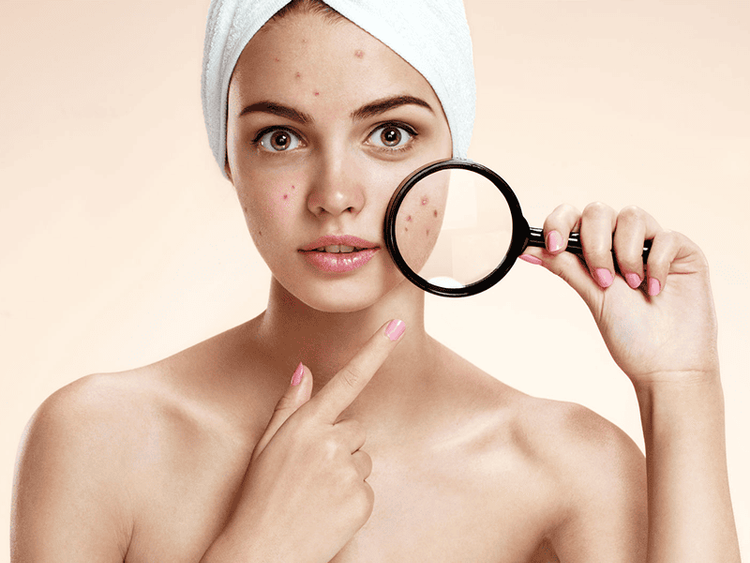
3. Acne treatment
If you've tried acne products for a few weeks and haven't worked, your doctor may prescribe stronger medications to:
Control your breakouts Avoid scarring or other damage to your skin Acne medications work by reducing sebum production, speeding up skin cell turnover, fighting bacterial infections or reducing inflammation - helping to prevent scarring. With most prescription acne medications, you may not see results for four to eight weeks, and your skin may get worse before it gets better. It can take months or years for acne to completely disappear.
The treatment regimen that the doctor recommends depends on the age, and the severity of the acne, and requires more patience on your part. For example, you may need to wash and apply medication to the affected area twice a day for several weeks. Often topical and oral medications can be combined. Pregnant women will not be able to use prescription drugs to treat acne.
Several medications are used, including:
Topical:
Retinoids: Retinoids are derived from vitamin A and include tretinoin (Avita, Retin-A, others), adapalene (Difin), and tazarotene ( Tazorac, Avage), commonly found in skin care products such as creams, gels or lotions. You use this medicine in the evening, when starting it should be used 3 times a week, then you can use it daily when your skin gets used to it. Retinoids work to unclog pores. Antibiotics: Antibiotics kill bacteria on the skin and reduce redness. During the first few months of treatment, you can use both a retinoid and an antibiotic, possibly with an antibiotic in the morning and a retinoid in the evening. Antibiotics are often combined with benzoyl peroxide to reduce the risk of antibiotic resistance. Such as clindamycin with benzoyl peroxide (Benzaclin, Duac, Acanya) and erythromycin with benzoyl peroxide (Benzamycin). Salicylic Acid and azelaic Acid: Azelaic acid is a natural acid found in grains such as barley and wheat. Azelaic acid has antibacterial and anti-inflammatory properties. A 20% azelaic acid cream is as effective as many conventional acne treatments when used twice a day for at least four weeks. It is even more effective when used in combination with erythromycin. The drug azelaic (Azelex, Finacea) can be used during pregnancy and while breastfeeding. Side effects include a change in skin color and minor skin irritation. Salicylic acid can treat acne conditions, but its effectiveness is quite limited. Dapsone. Dapsone (Aczone) 5% gel: used twice daily to treat inflammatory acne conditions, especially in adult women with acne. Side effects include skin redness and dryness. Oral medications:
Antibiotics: For severe acne, you may need to take antibiotics to fight bacteria and inflammation. Often the first choice for treating acne is a tetracycline antibiotic - such as minocycline or doxycycline - or a macrolide. You should take antibiotics for a short time to avoid the risk of antibiotic resistance. To treat acne effectively, antibiotics should be taken, combined with topical retinoids and benzoyl peroxide. Studies have shown that using topical benzoyl peroxide along with taking antibiotics can reduce the risk of antibiotic resistance. Antibiotics can cause side effects, such as stomach upset and dizziness. These medications can also make your skin more sensitive to the sun.
Combination birth control pills: Birth control pills are considered an effective acne treatment. Birth control pills that contain estrogen and progestin (Ortho Tri-Cyclen, Yaz, others). You may not see the effectiveness of acne treatment with birth control pills for a few months, so in addition to taking birth control pills, you should use some other topical medications before the pill has any real effect. . The most common side effects of these drugs are weight gain, breast pain, and nausea. A potentially serious complication is an increased risk of blood clots. Anti-androgen: The drug spironolactone (Aldactone) can be used in women and teenagers if antibiotics don't work for acne. The drug works by blocking the overactivity of androgens. Side effects may include chest pain. Isotretinoin: Isotretinoin (Amnesteem, Claravis, Sotret) is a powerful medication used for people with severe acne that has not responded to other treatments. Isotretinoin is highly effective. But because of the drug's side effects, doctors need to monitor it closely if you choose to use isotretinoin. Side effects include ulcerative colitis, an increased risk of depression, and serious birth defects. In fact, isotretinoin carries such a risk of serious side effects that all people taking isotretinoin must be carefully monitored. In addition, doctors can use other therapies with or in combination with medication:
Laser and photodynamic therapy: A variety of light-related therapies have been tested and achieved. certain work. But more research is needed to determine the ideal method, light source, and dosage. Remove whiteheads and blackheads: Your doctor may use special tools to gently remove whiteheads and blackheads (comedos) that have not been cleared with topical medication. This technique can cause scarring. Steroid injections: Lymph node and cystic lesions can be treated with a direct injection of a steroid medication. This therapy resulted in rapid improvement and pain relief. The side effect of this technique is thinning of the skin in the treated area. Most studies on acne medications have involved people 12 years of age and older. In a study of 365 girls between the ages of 9 and 10, 78% of them suffered from acne lesions. If your child has acne, you should consult a pediatric dermatologist. A guide to medications that should be avoided in children, appropriate dosages, drug interactions, side effects, and treatments that can affect a child's growth and development.
To book an appointment for your baby's examination and vaccination at Vinmec International General Hospital, you can contact HERE.
Article referenced source: Mayoclinic.org
MORE:
Why are pores getting bigger and bigger? Areas of the body prone to folliculitis Note when taking care to tighten facial pores




